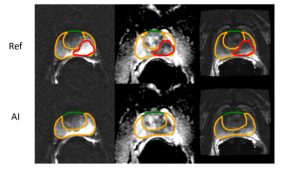The U.S. Department of Energy oversees national energy policy and production. As big a job as that is, the DOE also does so much more — enough to have earned the nickname “Department of Everything.”
In this episode of the NVIDIA AI Podcast, Helena Fu, director of the DOE’s Office of Critical and Emerging Technologies (CET) and DOE’s chief AI officer, talks about the department’s latest AI efforts. With initiatives touching national security, infrastructure and utilities, and oversight of 17 national labs and 34 scientific user facilities dedicated to scientific discovery and industry innovation, DOE and CET are central to AI-related research and development throughout the country.
Hear more from Helena Fu by watching the on-demand session, AI for Science, Energy and Security, from AI Summit DC. And learn more about software-defined infrastructure for power and utilities.
Time Stamps
2:20: Four areas of focus for the CET include AI, microelectronics, quantum information science and biotechnology.
10:55: Introducing AI-related initiatives within the DOE, including FASST, or Frontiers in AI for Science, Security and Technology.
16:30: Discussing future applications of AI, large language models and more.
19:35: The opportunity of AI applied to materials discovery and applications across science, energy and national security.
You Might Also Like…
NVIDIA’s Josh Parker on How AI and Accelerated Computing Drive Sustainability – Ep. 234
AI isn’t just about building smarter machines. It’s about building a greener world. AI and accelerated computing are helping industries tackle some of the world’s toughest environmental challenges. Joshua Parker, senior director of corporate sustainability at NVIDIA, explains how these technologies are powering a new era of energy efficiency.
Currents of Change: ITIF’s Daniel Castro on Energy-Efficient AI and Climate Change
AI is everywhere. So, too, are concerns about advanced technology’s environmental impact. Daniel Castro, vice president of the Information Technology and Innovation Foundation and director of its Center for Data Innovation, discusses his AI energy use report that addresses misconceptions about AI’s energy consumption. He also talks about the need for continued development of energy-efficient technology.
How the Ohio Supercomputer Center Drives the Future of Computing – Ep. 213
The Ohio Supercomputer Center’s Open OnDemand program empowers the state’s educational institutions and industries with computational services, training and educational programs. They’ve even helped NASCAR simulate race car designs. Alan Chalker, the director of strategic programs at the OSC, talks about all things supercomputing.
Anima Anandkumar on Using Generative AI to Tackle Global Challenges – Ep. 204
Anima Anandkumar, Bren Professor at Caltech and former senior director of AI research at NVIDIA, speaks to generative AI’s potential to make splashes in the scientific community, from accelerating drug and vaccine research to predicting extreme weather events like hurricanes or heat waves.
Subscribe to the AI Podcast
Get the AI Podcast through iTunes, Google Play, Amazon Music, Castbox, DoggCatcher, Overcast, PlayerFM, Pocket Casts, Podbay, PodBean, PodCruncher, PodKicker, Soundcloud, Spotify, Stitcher and TuneIn.








